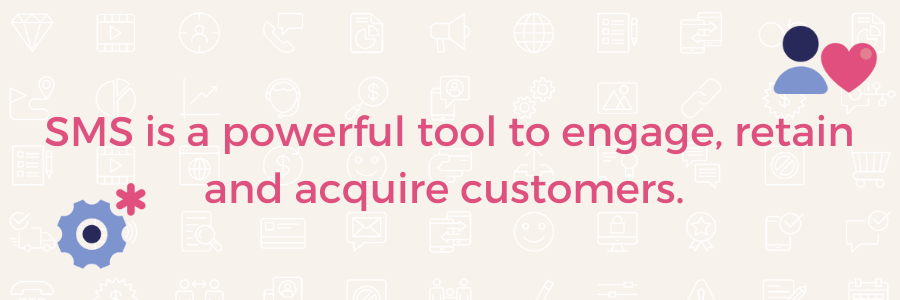Marketers and business owners have been using SMS to connect with consumers like never before. And with good reason. It has a 98 percent open rate and an unparalleled direct response rate. And, while the benefits of short message service (SMS) marketing are known, the best practices for SMS campaigns that help business owners reap those benefits can be overlooked. So, let’s talk about effective SMS.
SMS is a very personal channel.
That’s why you need to start with respect.
It can be the first interaction you have with someone or a constant one throughout a customer’s lifetime. It’s beneficial in many ways but it can be seen as frustrating or irrelevant if not used responsibly.
This article will cover four essential principles you need to plan for when sending efficient and effective SMS communications that cut through.
1. Be upfront: get consent to send
- Be courteous.
- Be transparent.
- Be responsible.
And if you do all that, make sure your customer is expecting to hear from you. Don’t mess up your great connection by sending an unwanted text message. Ultimately, you want to ensure that your customers are receiving messages they want and may find valuable—and not see it as spam. Having an easy way to opt-in and out of SMS messages you send can keep your satisfied customers engaging with you and not unsubscribing or blocking your number.
SMS Opt-In Best Practices:
- Be clear about what types of SMS campaigns you may send to them and why. It’s all about everyone being on the same page.
- Give your customers a sense of how often or frequently they can expect to receive text messages. Such as appointment reminders, special events etc.
- Share a link to your website or location where they can find more information like addresses, privacy policies or terms and conditions.
2. Be known: identify yourself
Trust is vital, and that’s why you need to make yourself known in the first few words. Include your brand or name at the beginning of your SMS message, especially if they don’t have a known number or alpha tag. This will help them easily recognise and pay attention. And, remember, it’s a text. So keep your text messages casual and conversational too – something along the lines of ‘Hi [first name]! It’s [company name]. Thanks for signing up!’

3. Be human: personalise your SMS messages
Personalising your SMS is a simple but effective way to connect with your customers that makes them feel known and valued. You can personalise your SMS campaigns in lots of ways, from name or location in a text message, to adding a unique code, link or timing to a special date.
With more than 70 per cent of consumers saying they only engage with personalised messaging, here are a few text message tips you can use to personalise your SMS campaigns:
Use their name
Mentioning the recipient by name is an easy way to make them feel special. It shows that you took the time and effort to personalise the message for them alone.
Know when to use MMS (multimedia messages)
A picture is worth a thousand words, so you can say more with less using MMS (multimedia messages). On average, MMS campaigns have a 15 percent higher click-through rate than SMS messages. Add a photo, audio or video to create engaging MMS campaigns and increase click through rates. Bear in mind that the maximum MMS size limit is 2MB per message but this may also depend on your service provider.
SMS has a 160-character limit, so be concise
You can add context by including images (MMS), but SMS has a 160-character limit, so make sure every word counts. The fewer characters you use, the more likely your audience is to read it all the way through.
4. Be compliant: never forget SMS compliance
SMS messaging has become a popular way for businesses to communicate with their customers and provide offers and incentives to purchase products or services. But you need to keep in mind the regulations like the Spam Act 2003 (Cth- for Australia) when sending SMS messages to your customers. Other countries may have their own SMS marketing compliance rules and legislations as well so make sure you are complying with the requirements of the region in which your SMS campaign is set to run.
As a general rule of thumb, only send commercial SMS messages if:
- The recipient has consented to receive your SMS messages.
- Your business is correctly identified in the message or in the information around the message.
- You provide a functional unsubscribe facility in every message so that customers can opt-out of further communications.

At Tall Bob, we help you reach your target audiences directly and effectively by truly connecting on the channels they use most. We’ll help ensure your audience is responding to your messages and that they’re converting into customers. Partnering with us means partnering with SMS and MMS experts.


